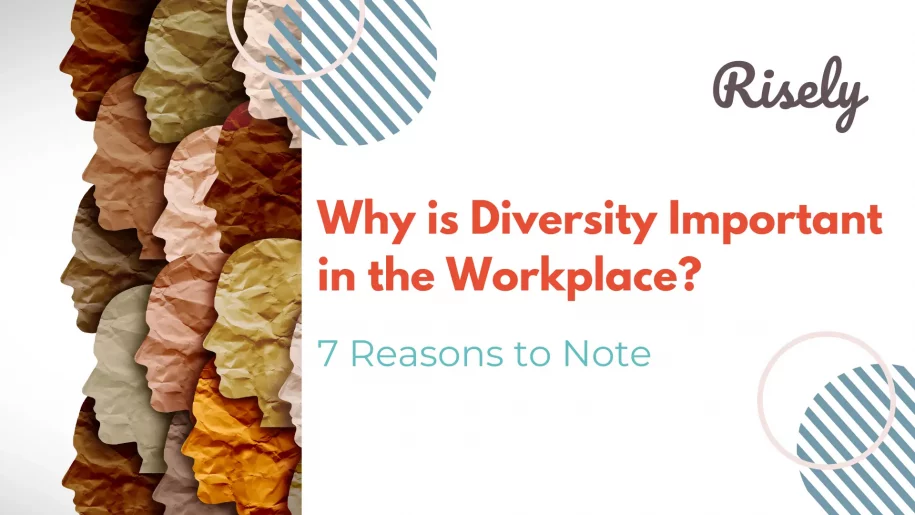Why is Diversity Important in the Workplace? 7 Reasons to Note
Conventionally, teams at work are made up of similar people. They are usually from the same place and reached there after living pretty similar lives. The sense of familiarity certainly breeds cohesion. But, is that all there is to the people who make the team? As borders have lost their impact to globalization, employees are increasingly moving across the world to join teams located far away. Numerous socio-political developments have paved the way for building diverse teams at workplaces. And recently, there is a significant emphasis on the motto of DIE – diversity, inclusion, equity. Diversity not only allows for different perspectives but also helps to compensate for individual weaknesses. When everyone on a team is pulling in the same direction, performance improves dramatically. In this blog, we’ll explore the importance of diversity in teams and discuss how to create a team that is diverse. We’ll also share tips on how to overcome any barriers that may stand in your way of achieving this goal. So read on and learn how to make your work environment more inclusive!What is Diversity?
Diversity can be defined in many ways, but at its core, it refers to the inclusion of people from different backgrounds and viewpoints. Simply put, diversity is the variety of people and cultures that make up a population. A diverse workplace is made up of various sorts of people. People can differ in many ways – from how they look to how they think. This heterogeneity of views and visions is the key to a diverse workplace. Diverse employees come from multiple backgrounds, nations, ethnicities, gender, religion, and other classifications. In workplaces, it’s important to have a diverse team to avoid any groupthink. Individuals with stronger opinions or experience can easily sway a homogenous team. It will adversely affect the quality of decision-making and work. Further, a homogenous team is more likely to continue working on their conventional paths and ideas, leaving little space for new options to settle. The likelihood of perpetuation of a single ideology is extremely high. Although teams need to align with the manager’s vision, it is also essential that additions and alterations are made according to the circumstances. Diversity is crucial in enabling this primarily. The benefits of diversity in teams cannot be overemphasized! A diverse workforce not only leads to better performance but also provides employees with opportunities for growth and development. We will look into the benefits of building diversity in teams next!What are the common types of diversity in workplaces?
- Cultural Diversity: This refers to differences in nationality, ethnicity, language, religion, and cultural backgrounds. It encompasses traditions, customs, and beliefs that individuals bring to the workplace.
- Gender Diversity: Gender diversity involves the presence of both men and women in the workplace, as well as recognizing and supporting individuals who identify with non-binary or other gender identities.
- Generational Diversity: Generational diversity focuses on the differences between different generations in the workplace, including Baby Boomers, Generation X, Millennials, and Generation Z. Each generation has distinct values, communication styles, and work preferences.
- Ability and Disability Diversity: Ability diversity encompasses individuals with different physical, sensory, cognitive, and mental abilities. It emphasizes inclusivity and accessibility for employees with disabilities.
- Socioeconomic Diversity: Socioeconomic diversity reflects differences in socioeconomic status, including income, education, and socioeconomic background. This type of diversity acknowledges that employees come from various economic circumstances.
Why is Diversity Important in the Workplace?
The workplace is an environment where diverse teams are more likely to achieve success. After years of struggle, diverse teams have gained acceptance in the corporate scene globally. Initially, diversity was treated as a tokenistic measure, meant solely for enhancing employer equity. Over the years, the importance of diversity is getting its due share of importance. Legal measures in this direction have been helpful too. A 2020 study by the consulting giant McKinsey also points in the same direction – diversity helps you win! After conducting an expansive study on the business case for diversity, they have concluded that companies scoring higher on DEI are continuously outperforming the rest in terms of profitability too. The benefits of diversity can be summed up as:Boost to creativity and innovation
Creativity is one of the most essential ingredients in any type of business. It is critical in making the business move forward in tune with the world. A diverse team helps unleash the creative potential of everyone in the organization. A diverse team brings together people with different experiences, ideas, and perspectives. Their unique lived experiences add to the knowledge pool of the team, based on which they can develop innovative ideas. A diverse workforce provides an impetus for increased creativity in both individual employees as well as the organization itself.Develop a smarter approach to problems
One of the most significant benefits of diversity is that it leads to better problem-solving. People from different backgrounds have a unique perspective on the world, which helps them see things in a nonlinear way. This enhances their ability to think through problems and come up with creative solutions. As team members share their insights, they also help each other come up with sound arguments and defend decisions made. The range of experiences and perspectives included in a team stimulates people’s intellectual growth. This in turn enhances their problem-solving abilities, as well as their ability to make sound decisions and asses risks.Employee satisfaction rises
Diversity in the workplace has numerous benefits for both employees and companies as a whole. Employees are more satisfied if they feel that their work represents different cultures, backgrounds, and points of view. Low turnover rates are another positive outcome of diversity because it means that people aren’t leaving to join other workplaces where they feel more appreciated. Higher engagement levels also result from a diverse workforce. This is because team members have opportunities to share their own perspectives and experiences with each other. Diversity fosters camaraderie among staff members and encourages them to reach out for help when they need it. Employees can also collaborate and build relationships over their shared experiences. All in all, it encourages better team dynamics.Improved profits & higher employer equity
One of the main reasons that diversity is beneficial to businesses is because it leads to better profits. A diverse workforce has a greater ability to problem solve and comes up with innovative ideas. This improves company efficiency and results in higher profits. Additionally, a diverse workplace creates more shareholder value as employees are more engaged and loyal. As companies invest in employee training programs that focus on building cultural competency, they are also implicitly investing in their own market valuation. There are numerous advantages for both organizations that embrace diversity in their workplace culture and individual employees. Employers who focus on DIE initiatives build a good reputation among potential employees too. In addition, they are able to earn goodwill globally by creating a relevant impact.
How to create a diverse team?
You have seen what diversity can do for you, but that’s not the end of the story! At its core, a great team is about inclusion – welcoming everyone who has an interest and ability to contribute. This can be difficult in the beginning, but it’s important that you start by acknowledging that diversity exists and then work to create a workplace where everyone feels valued and appreciated. Here are some tips on how you can make your workforce more diverse:Overcome your biases
The first step to creating diversity in teams begins with removing the hurdles. Very often, it is the manager’s biases that prevent building a diverse team. Therefore, it is crucial to begin by acknowledging and defeating the biases. You will need to begin by understanding your biases and looking into ways to minimize their impact. Further, you need to ensure that your policies are based on objectivity, otherwise, they will be affected by biased behavior too.Re-haul your interview and pay processes to make them inclusive
The second step to creating a diverse team is by altering the way that you interview and pay employees. interviews should be more objective, with questions asked about experience and knowledge rather than personality traits or hobbies. Similarly, it’s important to review your compensation processes in order to ensure that all employees are fairly rewarded for their contributions. You could also try to involve teams and adopt techniques like 360-degree feedback that do not rely on the opinion of a single individual. The process has to begin at onboarding.Equally value efforts of all employees
The essential step to creating a diverse team is by treating all employees the same. This means giving them the opportunity to voice their opinions, provide feedback, and work collaboratively. You should try to encourage employees show trust in them. It’s also important to ensure fairness in appraisal systems. By doing this, you will create an environment where everyone feels valued and appreciated for their efforts, not for who they are.Educate and sensitize your team
Just like you, some of your team members could be suffering from biases that they don’t realize. Here, awareness about DEI initiatives is crucial. It’s important to educate your workforce about the importance of diversity and inclusion. This can be done through training programs, company-wide messaging, or even social media campaigns. You need to start the conversation on diversity in your team. By doing this, you will create a more tolerant and understanding workplace where everyone is able to contribute their best work possible. Moreover, a comfortable environment helps improve employee satisfaction. Here are a few ways to show support to your LGBTQIA+ colleagues.Other Interesting Reads
Provide support mechanisms
You can take the conversation one step forward and transform it into meaningful actions. This can include taking steps like organizing employee resource groups, guest lectures, and executive training sessions that help increase awareness and acceptance. Moreover, managers also need to establish policies that deal with workplace discrimination and harassment in order to ensure a safe and inclusive environment for everyone. Individuals belonging to diverse backgrounds are more likely to be preys of bullying and toxic behavior. Hence, it is crucial to ensure that these mechanisms are easily accessible and objective. You can also check out: How can managers effectively manage diversity at workplace? for more helpful tips. When it comes to success, diversity is key. A diverse team can come up with new and innovative ideas that would not be possible if everyone was the same. This is because different perspectives often result in better decisions. Additionally, diversity helps people feel comfortable voicing their opinions. This in turn leads to a more productive team environment. By including people from diverse backgrounds and experiences, teams can reach great heights. It’s important to remember that this process is not easy, but it is worth it in the end. So, get started today by creating a diverse team that will help you reach your goals!Conclusion
Diversity is key in the workplace for a number of reasons. By having a team that is diverse in terms of gender, ethnicity, and culture, you are able to tap into a wealth of different perspectives and ideas. This allows for better problem-solving and team work, as everyone on your team can contribute their unique knowledge and experience. In order to create a team that is diverse, start by understanding what diversity is and why it is important. We hope this blog has helped you understand the importance of diversity in the workplace and how to create a team that is inclusive of all people.Test your decision-making Skills today to lead diverse teams effectively.
Biases impair a manager’s objectivity in decisions.
Check how well you are doing as a leader today.
FAQs
What is the importance of diversity in team creativity?
Diverse teams can entertain and accept multiple perspectives. Owing to the inherent diversity, there are multiple points of view at the table, many of which can break conventional boredom and develop creative solutions to challenges.
How do you use diversity in a team?
Diversity brings many benefits to the team. In addition to creating an inclusive group of people working together, it helps to develop acceptable solutions across a broader range of people. Managers can use diversity to create a collaborative and creative space.
Other Related Blogs
8 Succession Planning Challenges: With Real-life Examples and Failures
8 Succession Planning Challenges: With Real-life Examples and Failures Are you ready to pass the baton? Succession planning is a critical process that ensures a smooth transition of leadership within…
Understanding Negative Bias And Its Cause, With 7 Strategies To Overcome It
Understanding Negative Bias And Its Cause, With 7 Strategies To Overcome It Have you ever formed snap judgments about someone based on their appearance, personality, or background? Of course, we…
Top 8 Challenges of Diversity in the Workplace in 2023
Top 8 Challenges of Diversity in the Workplace in 2023 Company culture is the cornerstone of success. It’s the foundation on which businesses are built and can be the key…
Understanding Cross Cultural Communication In The Workplace: Top 5 Examples
Understanding Cross Cultural Communication In The Workplace: Top 5 Examples Effective communication is the most valuable skill to foster a collaborative work environment. As the team becomes more diverse, it…


